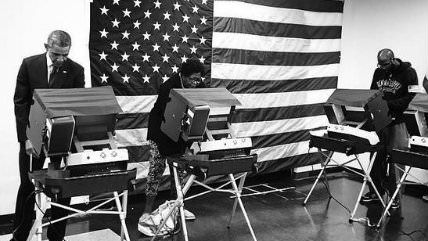The New Presidential Propaganda
Imagery of the chief executive is more tightly controlled and carefully considered than ever.

There is a photograph of Barack Obama, taken by the official White House photographer, only minutes before his first inauguration. Obama stands before a mirror. His reflected expression is intense, but ambiguous. Depending on your interpretation, the former Illinois senator looks dignified and confident-or paralyzed with fear. At that very moment, millions of Americans were waiting to see their new president address the nation for the first time. What sort of a person were they going to see?
Even after an exhausting presidential campaign, it was an open question. For months, rumors circulated about Obama's place of birth. Pew Research polls showed a growing minority of Americans believed he was Muslim. Public figures like Donald Trump and Sean Hannity were openly asking: Who is this guy?
The ferocity of the personal attacks demanded a forceful response. Fortunately for the president, social media was just then exploding into mainstream popularity. The administration began to use sites like Facebook, Instagram, and Flickr to reshape public perceptions with a compelling counter-narrative.
"The White House has effectively become a broadcast company," says Michael Shaw, publisher of BagNews Notes, a blog dedicated to the analysis of news images. "The White House, they went to create an identity for the president. And they did that in very interesting ways. One would be to associate him much more with popular culture."
The first year of the Obama presidency generated a stream of photo ops that pushed a clear editorial line. Images of the president hobnobbing with George Clooney, Bruce Springsteen, Robert De Niro, Bono, and Beyonce began appearing on White House Flickr and Instagram pages. Photographers on the presidential payroll depicted Obama as a larger-than-life figure, respected by leaders abroad and BFFs with celebrities at home.
As the White House gained more control over the creation and distribution of its own images, the less inclined it was to allow the independent press to photograph the president. Photojournalists have been prohibited from covering the president's meetings with Israeli and Palestinian negotiators, the Dalai Lama, and Hillary Clinton, among other events of undisputed public interest.
All the while, Pete Souza, Obama's official photographer, has enjoyed unfettered access to the president. To commemorate the 58th anniversary of Rosa Parks' act of civil disobedience, Souza had Obama reenact a famous photograph of Parks inside the original city bus. During the shoot, independent photojournalists were kept at a distance, unable to view the scene from their position behind a rope-line.
But after six years of gradually being excluded from White House events, the press is fighting back. Santiago Lyon, the Associated Press director of photography, wrote last year in The New York Times that the Obama administration has "systematically tried to bypass the media by releasing a sanitized visual record of his activities through official photographs and videos, at the expense of independent journalistic access."
Thirty-eight news organizations have signed a letter of protest to the White House, stating, "As surely as if they were placing a hand over a journalist's camera lens, officials in this administration are blocking the public from having an independent view of important functions of the Executive Branch of government."
But there's little else the independent media can do. "Because [the president] can distribute directly through all these different channels," says Shaw, "there's really not much downside to it, there's not much accountability."
All over the world, leaders are producing idealized versions of their own identities on social media. Politicians are increasingly free to project their own self-image directly to the public, with less accountability than ever from an independent press. From the White House on YouTube to 10 Downing Street on Flickr and even Bashar al-Assad's Instagram page, we may never see our politicians in the same way again.


Show Comments (188)